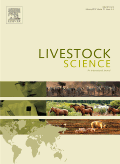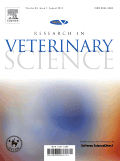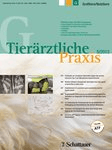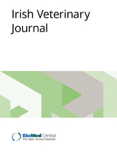
Brazilian Journal of Hygiene and Animal Sanity
Scope & Guideline
Innovating hygiene practices for a healthier world.
Introduction
Aims and Scopes
- Veterinary Clinical Case Reports:
The journal publishes detailed case reports on various veterinary surgical and medical interventions, showcasing innovative approaches and techniques in the treatment of animal diseases. - Animal Disease Management and Diagnosis:
Research articles focus on the diagnosis, treatment, and management of infectious and non-infectious diseases in various animal species, contributing to better veterinary practices. - Hygienic Practices in Animal Production:
The journal emphasizes the importance of hygienic and sanitary practices in animal farming and processing, aiming to improve food safety and public health. - Zoonotic Diseases and Public Health:
Investigations into zoonotic diseases that affect both animals and humans are a critical area of study, highlighting the journal's commitment to public health implications of animal health. - Animal Nutrition and Welfare:
Studies related to animal nutrition, including the impact of different feed components on health and productivity, align with the journal's broader aim of promoting animal welfare.
Trending and Emerging
- Advanced Diagnostic Techniques:
There is an increasing focus on the use of advanced imaging and diagnostic methods, such as computed tomography and ultrasonography, to improve disease diagnosis and management in animals. - Case Reports on Rare or Emerging Diseases:
Recent years have seen a rise in case reports detailing rare or emerging diseases in pets and livestock, highlighting the need for awareness and research in less common veterinary conditions. - Integration of Nutrition and Health:
Studies that explore the relationship between animal nutrition and health outcomes are trending, emphasizing the importance of dietary influences on veterinary medicine. - Zoonotic Disease Awareness and Control:
With the growing recognition of zoonotic diseases, there is a notable increase in research addressing public health implications and control measures for diseases transmissible from animals to humans. - Innovative Treatment Approaches:
The journal is increasingly publishing articles on innovative surgical and medical treatments for animals, reflecting advancements in veterinary medicine and a commitment to improving animal care.
Declining or Waning
- Traditional Animal Breeding Practices:
There has been a noticeable decline in research focused on traditional animal breeding practices, possibly due to a shift towards genetic advancements and biotechnology in animal husbandry. - In-depth Reviews on Animal Behavior:
While animal behavior studies were once a prominent feature, fewer comprehensive reviews and studies are being published, indicating a potential waning interest in this area. - General Veterinary Education Topics:
The journal has seen a decline in articles dedicated to general veterinary education and training, suggesting a shift towards more specialized and applied research. - Microbial Pathogenesis Studies:
Research specifically focused on microbial pathogenesis in animals appears to be decreasing, possibly as more attention is given to practical applications in disease management and prevention. - Environmental Impact Studies on Animal Farming:
Research exploring the environmental implications of animal farming practices is becoming less frequent, which may reflect changing research priorities within the journal.
Similar Journals

Livestock Science
Advancing Knowledge in Animal Science and Veterinary MedicineLivestock Science is a prestigious academic journal published by ELSEVIER, dedicated to the comprehensive study of animal science and veterinary medicine. With an esteemed Q1 ranking in both the fields of Animal Science and Zoology, as well as Veterinary (miscellaneous) in 2023, this journal is recognized for its impactful contributions to the understanding of livestock health, production, and management. The journal has consistently earned its high position within Scopus, ranking 26th out of 194 in General Veterinary and 86th out of 490 in Animal Science and Zoology, reflecting its significant influence within the research community. The open access policy allows for broader dissemination of knowledge, promoting collaboration among researchers, professionals, and students alike. With its continuous publication cycle from 2006 to 2024, Livestock Science remains an essential resource for anyone interested in the advancements, challenges, and innovations within the field of livestock management and veterinary practices.

CANADIAN JOURNAL OF VETERINARY RESEARCH-REVUE CANADIENNE DE RECHERCHE VETERINAIRE
Bridging the Gap Between Research and Practice in Veterinary MedicineCanadian Journal of Veterinary Research - Revue Canadienne de Recherche Vétérinaire is a leading publication in the veterinary science community, published by the Canadian Veterinary Medical Association. Established in 1986, the journal serves as a crucial resource for researchers and practitioners alike, covering a broad spectrum of topics pertinent to veterinary medicine and animal health. With a current impact factor placing it in Q2 in the Veterinary (miscellaneous) category, it holds a rank of #85 out of 194 in Scopus for general veterinary research, demonstrating its influence and importance within the field. While the journal is not open access, it remains committed to the dissemination of high-quality research that fosters advancements in veterinary practice and education. Based in Ottawa, Canada, it strives to connect the international community of veterinary researchers and professionals through rigorous peer-reviewed articles that advance knowledge and methodologies in veterinary science.

Iranian Journal of Veterinary Research
Fostering Knowledge in Animal Science and ZoologyWelcome to the Iranian Journal of Veterinary Research (IJVR), a prestigious platform dedicated to advancing the field of veterinary science. Published by Shiraz University, this journal plays a pivotal role in disseminating high-quality research findings amid a vibrant academic community. With its ISSN 1728-1997, and a convergence of studies from 2008 to 2024, IJVR serves as an essential resource for veterinarians, researchers, and students interested in Animal Science and Zoology. Recognized in the Q3 quartile for both Animal Science and Veterinary categories, it holds a respectable position with Scopus rankings placing it in the 54th percentile among general veterinary journals. Although it currently lacks an open access model, the journal ensures that cutting-edge veterinary research is presented with rigor and relevance, fostering knowledge that contributes to animal health and welfare. With its strategic focus on innovative methodologies, clinical practices, and the biological sciences, the IJVR is set to become your go-to source for critical advancements in veterinary research.

RESEARCH IN VETERINARY SCIENCE
Unveiling Insights for Veterinary ExcellenceRESEARCH IN VETERINARY SCIENCE, published by Elsevier Science Ltd, stands as an authoritative platform in the field of veterinary studies. With its origins dating back to 1965, this prestigious journal is recognized for its contribution to the advancement of veterinary knowledge and practices, boasting a remarkable Q1 categorization in Veterinary (miscellaneous) and ranking 24th out of 194 in the Scopus veterinary general category, placing it in the top 13% of its field. The journal presents a diverse range of research articles that explore critical topics in veterinary science, thereby facilitating evidence-based practices and innovations. Although currently not an open-access journal, it remains highly accessible through institutional and personal subscriptions, allowing researchers, professionals, and students to benefit from its rich collection of studies. As it moves toward 2024, RESEARCH IN VETERINARY SCIENCE continues to be a vital resource for those dedicated to improving animal health and advancing veterinary science.

JAPANESE JOURNAL OF VETERINARY RESEARCH
Advancing veterinary science through innovative research.The Japanese Journal of Veterinary Research, published by Hokkaido University, is a pivotal resource in the field of veterinary science, focusing on a wide array of topics that contribute to the advancement of veterinary research. Established in 1965, this esteemed journal has been at the forefront of disseminating innovative research findings and methodologies crucial for animal health and welfare in Japan and beyond. With an ISSN of 0047-1917 and recognized in the Q3 quartile of veterinary journals, it serves as a significant platform for both established researchers and emerging scholars, fostering a collaborative environment that aims to elevate veterinary practice. Although it operates under a traditional subscription model without open access, the journal's selectivity and rigorous peer-review process enhance the quality of published works, attracting attention from global audiences. Based in Sapporo, Japan, the journal continually strives to provide a vital forum for discussions that shape the future of the veterinary profession.

TIERAERZTLICHE PRAXIS AUSGABE GROSSTIERE NUTZTIERE
Elevating the discourse on animal health and management.TIERAERZTLICHE PRAXIS AUSGABE GROSSTIERE NUTZTIERE is a pivotal journal in the field of veterinary science, focusing specifically on large animals and food production animals. Published by GEORG THIEME VERLAG KG, this journal has been a resource for veterinary professionals since its inception in 1996, delivering current research and practical insights to its readership through 2024. Despite its classification in the Q4 quartile for both Food Animals and Veterinary (miscellaneous) categories, the journal provides an essential platform for emerging studies, contributing to the interdisciplinary dialogue around veterinary practices. Researchers and practitioners benefit from the journal’s commitment to advancing knowledge, despite its modest rankings in Scopus where it stands at rank #150 in General Veterinary and #32 in Food Animals. While not currently offering Open Access options, the journals’ significant body of work remains an invaluable asset for those dedicated to enhancing animal health and welfare. TIERAERZTLICHE PRAXIS serves as a cornerstone for academic exploration and practical application in the veterinary field, fostering a deeper understanding of the complexities involved in animal care and management.

Thai Journal of Veterinary Medicine
Cultivating excellence in veterinary medicine across Thailand.Thai Journal of Veterinary Medicine, published by Chulalongkorn University, serves as a vital resource for researchers, practitioners, and students in the field of veterinary science. With an ISSN of 0125-6491, the journal has been providing a platform for the dissemination of original research and reviews since its inception, with a focus on advancing veterinary practice and animal health in Thailand and the broader Southeast Asian region. The journal is recognized in the Scopus database, currently ranked in the Q4 category for Veterinary (miscellaneous), reflecting its commitment to quality despite being in a highly competitive space. The scope of the journal encompasses a wide array of topics pertinent to veterinary medicine, ensuring accessibility to diverse veterinary disciplines. While the journal currently does not offer an open-access option, it remains dedicated to contributing valuable knowledge and insights to the veterinary community, supporting the improvement of animal welfare and public health initiatives in the region. As it continues to publish until 2024, the Thai Journal of Veterinary Medicine invites contributions that align with its objectives of fostering scholarly discourse and advancing veterinary research.

IRISH VETERINARY JOURNAL
Elevating veterinary knowledge to global audiences.IRISH VETERINARY JOURNAL is a premier open-access publication in the field of veterinary science, established to disseminate high-quality research and innovations that advance the veterinary profession and animal health. Published by BMC since 2004, this journal not only ensures worldwide access to cutting-edge findings but also maintains an impressive ranking as Q1 in the Veterinary (miscellaneous) category according to the 2023 metrics, highlighting its significance and influence. With an impressive Scopus rank of #19/194 and a 90th percentile placement, it provides a robust platform for researchers, professionals, and students alike to engage with the latest studies, reviews, and case reports. The journal's coverage spans from its inception in 1973 to the present, catering to a diverse audience interested in various aspects of veterinary science, ensuring that it remains an essential resource for those passionate about the welfare of animals and the advancement of veterinary practices.

Revista de Investigaciones Veterinarias del Peru
Empowering Veterinary Professionals Through ResearchRevista de Investigaciones Veterinarias del Peru, published by UNIV NACIONAL MAYOR SAN MARCOS, stands as a pivotal resource within the field of veterinary sciences. With its ISSN 1682-3419 and E-ISSN 1609-9117, this journal aims to publish innovative research contributing to the advancement of veterinary practices and animal health. Since its inception in 1999, it has fostered an academic platform for professionals and researchers alike to share findings that are crucial for understanding and improving animal welfare in Peru and beyond. Although currently positioned in the Q3 category of Veterinary (miscellaneous) and ranked #163 out of 194 in the Scopus database, the journal's commitment to quality research and open access to veterinary knowledge continues to attract submissions and readership from a diverse audience. As it moves forward into 2024, the Revista de Investigaciones Veterinarias del Peru remains dedicated to disseminating critical insights that promote evidence-based practices in the veterinary field, stimulating further research and collaboration across continents.

AUSTRAL JOURNAL OF VETERINARY SCIENCES
Fostering Excellence in Veterinary ScholarshipAUSTRAL JOURNAL OF VETERINARY SCIENCES is a prominent platform for innovative research in the field of veterinary science, published by UNIV AUSTRAL CHILE, FAC CIENCIAS VETERINARIAS. This journal, bearing the ISSN 0719-8000 and E-ISSN 0719-8132, serves as a vital resource for researchers, veterinarians, and students interested in advancing their knowledge in veterinary practices and animal health. With its influence reflected in its Q3 category ranking in the Veterinary (miscellaneous) field, and its Scopus rank of #95 out of 194, the journal highlights a robust commitment to disseminating valuable findings and insights. Between the years 2017 to 2024, it aims to provide open access to significant advancements and discussions in veterinary science, ensuring that vital research is accessible to a global audience. Located in Valdivia, Chile, the journal emphasizes its role in enhancing veterinary scholarship and fostering professional development within the community.